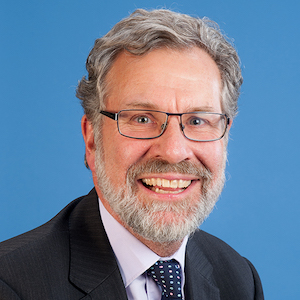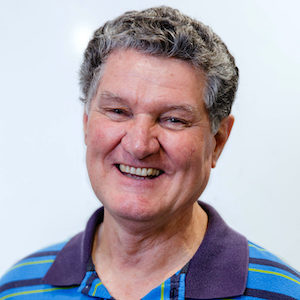-
"* Assuming you are fortunate enough to be healthy and have sufficient financial security, then look at it this way: you've been given the gift of quality time with your family and loved ones. A break from your usual work and travel schedule. Time to enjoy being together. Make a window of time every day at the same hour when the family comes together to do something special. If living alone, this could be over videoconferencing, but still the same time, with the same small group of loved ones or friends, every day. This could make the rest of your day look dramatically different. * Don't read too much news. Read some to get updates, but then spend the rest of your recreational reading time on a good book or on learning something new. * Do something physical every day. Don't just read and videoconference!"
Professor Ori Heffetz
Associate Professor of Economics, Cornell University and Hebrew University -
"There is no general answer to this question because 1) effects differ across people and situations and 2) 'wellbeing' remains undefined. If focussed on the life-satisfaction of people who experience 'huge emotional stress', research on effects of coping with disasters suggest that social contacts help. Unfortunately face-to-face contact is not possible for many singles locked at home, but social support can also be generated at distance using telephone and internet. Pro-active coping is generally conducive to happiness, but most people can do little to change this particular situation. Still, it is recommendable to organize one's temporary confinement as good as possible and to prerpare for life after the epidemic. A last way to cope is controling one's emotions, and this is particularly apt for people facing 'huge emotional stress'. Ways to calm down are relaxation (e.g. by meditation) and diversion (e.g. do repairs in your house)"
Professor Ruut Veenhoven
Professor of Sociology, Erasmus University Rotterdam -
The slowdown could be seen as an opportunity during which the consumption of media content is not filling every free minute that becomes available. Instead the situation might offer an ideal pause to reflect about one's beliefs of what contributes to personal well-being, i.e. the personal well-being of oneself and of others.
Professor Alois Stutzer
Professor of Political Economics, University of Basel -
Maintaing a strict daily time structure (working in home office, sport activities, leisure time, fixed time to get up and to go to bed); joint skype-dinner with friends; getting information about the crises but not permanently gathering information all day long
Professor Ronnie Schob
Professor, School of Business and Economics, Freie Universitat Berlin -
"One key challenge is not to give in to fear, for which it helps to train oneself to be comfortable with the idea of death so that one cannot be frightened too much by the prospect of it. To those who do not believe in afterlives, viewing death as a normal part of life helps, as is the realisation that human minds change continuously, including our memories, our identities, and our skills, such that our ""old selves"" die a little every day anyway, making death seem less dramatic. Diaries, routines (write down every day 5 nice things you have seen others do) and positive, preferably physical, contact with others also help avoid mental health deterioration. "
Professor Paul Frijters
Professorial Research Fellow, CEP Wellbeing Programme, London School of Economics -
"Get outside - Even just a few minutes outside can help reduce feelings of isolation and claustrophobia. Stay connected on FaceTime, Skype, etc. - Regular contact with friends and loved ones is important to stave off loneliness. Continue to eat healthily and exercise - Both to feel better and keep your immune system strong."
Professor Daniel Benjamin
Associate Professor of Economics, University of Southern California -
"Exercise (aerobic, strength, flexibility). Have lots of sex. Eat healthy food. Prioritise sleep. Do something each day that is exclusively for the promotion of your own mental wellbeing. Work on relinquishing mental tethers to behavioural norms that do not promote your happiness or the happiness of those around you. Divide the household responsibilities so everyone has a clear area for which he or she is the go-to person. This gives each person a valuable role to fill, bonding people together. Develop closeness/communication rituals, like a story-telling session every night at dinner, or sharing ""the best and the worst"" of each person's day, or listening to music together, watching a movie as a family twice a week, or having a weekly Q&A within the family in which people explain what they plan to do when the current crisis lifts, and why. Social routines like this help keep people close and give people something to look forward to. Encourage a mechanism of sharing gripes within the family, such as having an anonymous complaint box from which one complaint is extracted per week and the person named as the offender is asked to describe the steps to address the complaint. This provides an outlet for stress and frustration and also a direction for improvement, allowing a greater sense of control for the people on each side of a complaint. "
Professor Gigi Foster
Associate Professor and Undergraduate Coordinator, School of Economics, UNSW Business School -
"- Keep in very regular touch with family members (e.g. by zoom). - Check in with neighbours, even those you haven't met before. - Reconnect with family and friends who have become distant through pressures of lack of time (across the country and the world"
Professor Arthur Grimes
Chair of Wellbeing and Public Policy, School of Government, Victoria University of Wellington -
"- Avoid excessively consuming news (social media, TV). Watching the news twice a day should be sufficient. - To the extent possible, engage in voluntary help. There are many opportunities for this."
Professor Heinz Welsch
Professor of Economics, University of Oldenburg -
"Diverse experiences Unfortunately, general advice is difficult, as individual situations are highly diverse: the spread of the virus and policy responses differ by country and region; and people are affected very differently, e.g., with or without children, with work, home office or having lost ones job, and also rural versus urban populations. Inspiring personal accounts The print and online media offer numerous personal accounts of coping that I find inspiring. In the best of cases, one has time to rediscover neglected hobbies, reflect on priorities in life, and take respite from the usual treadmill. Happiness inequality I'm worried, though, that post-corona measurements of well-being will reveal an increase in ""happiness inequality"": those with low levels of well-being will tend to be hit harder than those in the upper part of the distribution where optimism and positive thinking (as well as material comfort) can help in dealing with the crisis. "
Professor Rainer Winkelmann
Professor of Economics, University of Zurich -
"The trait of the personality ""Neuroticism"" affects the way we react to external threats or pressure. It is an important characteristic for our survival, but in these circumstances may generate too much mental stress and anxiety especially for a people who tend to have a more neurotic personality. The problem is that there is no much one can do to effectively defend oneself against this kind of treats. Therefore, it would be useful to think of an ""exit"" strategy when negative thoughts start to populate your mind. This can be everything you usually find distracting, like exercising (if possibile), watching tv, some DIY, meditating, etc. "
Professor Eugenio Proto
Alec Cairncross Professor of Applied Economics and Econometrics, University of Glasgow, Adam Smith Business School -
- use social media actively to keep in touch with others (passive social media use has been found to be negatively associated with SWB); While frequent social media use is usually associated with lower SWB, there are now new ways that can help maintain so
Doctor Anke Plagnol
Lecturer in Psychology (Behavioural Economics), City University, London -
"Connect to OTHERS: Decades of research on happiness has shown that of the most — if not the most — important predictor of well-being is the quantity and quality of our social relationships. In particular, engaging in acts of kindness help boost well-being. Connect to NATURE: When there is plants, and parks, and oceans in front of us, we feel happier. Stuck in an apartment without any access to a green space? Looking and caring for a plant can have beneficial effects on WB. Listening to nature soundtracks. Even closing your eyes and spending 15 minutes imagining being in a natural environment can help mood. Connect to the PRESENT. My research suggest that one powerful way to boost happiness and cope with uncertainty is to engage in savoring. For example, take something you like: a hot bath, a glass of single malt whiskey and take a moment to experience it with all the 5 senses one by one. Connect to a PASSION that allows fulfill needs for autonomy, growth, or purpose (e.g., learn how to bake bread) Connect to EMOTIONS: if we think negative emotion are bad for health, we engage in all kinds of behavior to reduce or avoid these feelings--many of which are actually bad for WB (e.g., we drink or eat comfort food not to feel sad). Shifting our mindset and accepting that unpleasant emotions are useful, give us important information about the status of our goals, our needs, things that require our attention. "
Professor Jordi Quoidbach
Associate Professor of Behavioral Decision Making in the Department of People Management, ESADE Business School -
The one thing I would add is to consider the several different strategies for a happier life that comes out of the positive psychology literature. The scholars in this area have, of course, been working for decades now on general ways to foster one's one well-being, most of which are just as potentially helpful during the current crisis as they were before. To take just one example: why not try keeping a "gratitude journal"? This costs nothing in terms of money, and costs almost nothing in terms of using up one's time or energy--you can do a good job with a gratitude journal with five minutes a day. The basic idea should generalize to much of the advice from positive psychology, at least the kind of immediate interventions that help now, vs. more long term self-programming strategies that might take longer to see benefits from.
Professor Benjamin Radcliff
Professor of Political Science, University of Notre Dame -
"To maintain wellbeing during isolation during the COVID-19 outbreak my advice is to concentrate on three crucial things: planning, purpose, and people. Though also remember, whatever the outcome of attempts to maintain wellbeing, be compassionate. • Planning – establish routine: Instability and uncertainty can pose challenges to our health and happiness. Often we don’t realise how important the presence of structure is until it is taken away. Thus, in the absence of our usual daily and weekly routines, such as going to work, meeting friends, or playing a sport, it will help to put a solid routine of our own in place to ensure some stability and certainty. • Purpose – do meaningful activities: Having purpose and meaning can help guide our lives and is an essential component of our happiness. However, day-to-day we may not think about what is most meaningful to us because we normally don’t need to – we simply get up as we always do and go about our daily business. Thinking about what brings our lives purpose and meaning will guide us in planning activities for our day. • People – reach out to others: Having supportive relationships in our lives is a key source of wellbeing. In addition, helping others can fill our lives with purpose and meaning. Thus, reaching out to friends and family is important. Many of us will be struggling emotionally and to know that others are there can be tremendously reassuring. • Be compassionate: Our days won’t always go as we hope and there will be struggle. We don’t have to be happy all the time. It is helpful to accept how we feel and, rather than trying to push emotions away, offer yourself and others compassion. We are all doing our best given what we have and what we know "
Doctor Christopher Boyce
Honorary Research Fellow, University of Stirling -
"Individuals’ happiness depends on things one cannot change (personality) and on individuals’’ circumstances. The lockdown has put under pressure many circumstances that contribute to our life satisfaction (having a job, a good income, facing certainty, talk with friends,…) and at the same time it has increase the probability of having circumstances detrimental to our life satisfaction (bad health, the dead of a beloved one, being unemployed and facing an increase of unemployment rate, increase of inequality in our region, economic downturn,…). Since many context variables of the current situation are detrimental to life satisfaction, it is more important than usual to invest on those variables that are on our control and correlate positively with happiness. Some of these are: Since most of us care about inequality (especially when we feel is the outcome of an unfair shock, as the covid-19), think how you can help those in worse circumstances. If you have not lost your job, buy or acquire services from those who need it more. This will increase everybody’s happiness: it will make you feel good (volunteering effect), will decrease inequality, and will increase the income of someone else. If your economic situation has remain stable or even improved, do not make ostentation of this. You will not get much happier from this, but you will feel the unluckier ones very miserable (asymmetric reference comparisons). Instead show compassion. To reduce the feeling of uncertainty do not be all the time connected to the news. Health and economic news will detriment your happiness and you need to have a sensible dose of those. Invest in increasing your social capital through volunteering activities. Social capital, both formal (volunteering) and informal (meet with friends through video conferences) correlates substantially with happiness Education is an important variable to generate opportunities. If you cannot help your children with school work, look for volunteers in your neighborhood or friends circle to help who can do online teaching. This will increase everybody’s happiness (your children will get education, and other people will feel better as they help other). Improve your house, as house quality also increase happiness. Eat healthy as obesity negatively correlates with happiness. People experience important satisfaction when doing activities with their beloved ones. Try to have a strong contact with your family at dinner time and with video conferences with family and friends. People do not like commuting, take the commuting time to do something nice, rather than work more hours. On those countries where you can go out, it is very important to go to sport and with less pollution this should increase happiness"
Professor Ada Ferrer-i-Carbonell
Professor of Economics, IAE-CSIC -
Most of what we know on the psychology of isolation comes from studies on astronauts and small groups of polar scientists. Isolation often provokes a sort of “psychological hibernation”. The mind and the body slows down in conditions of limited stimulation. People may find it difficult to remember things or perform certain tasks. Other effects include depression, concentration difficulty, sleep disorders (sleeping too much or too little) and irritability. Astronauts spend arguing up to 30% of their time. Most polar adventures of the 19th century ended in riots, madness, suicides, cannibalism. Here below I list some something we have learned from these experiences. • Structure your day the most you can. Building routines helps to reduce anxiety connected to uncertainty. • Celebrate everything you can (birthdays, Easter etc. ) • Eat regularly and good food. Try not to contribute to the brilliant future of dieticians • Find your private space where you can be isolated from your quarantine mates. Although your home may be small, it should be possible. Astronauts find their private space even in tiny spaces • Be physically active: low intensity exercise (jogging, biking) gives your brain small injections of dopamine that improve your mood • Being active in your leisure time helps to fight depression: cooking or playing with your kids is better than watching tv • Focus on the present rather than on the uncertain future. Emphasize what you can control, not what is out of your control • Look for gratifications. Try to look beyond the obviously available ones (sex, food, good movies, music and readings….). Learn something new, it’s plenty of online activities now • Try to have fun. Humor and laughing are the best medicine.
Professor Stefano Bartolini
Professor of Economics, University of Sienna -
1. Find out what's going on and the threat of Covid-19 to your personal health (and to that of your family members). This should help you to get rid of fear and face the situation with a more detached mind (switch from fast to slow thinking: Kahneman 2011). 2. Try to understand what the Covid-19 can most probably change in your day and in your life, in order to plan the resources necessary to cope with it as soon as you can. This should make you feel effective and reduce uncertainty. 3. If you are particularly stressed by the situation caused by Covid-19, avoid informing yourself about the most gruesome details of the sanitary and social effects of the disease. 4. Since you have time and a detached mind during isolation, think about what was wrong with your life before the pandemic, and plan what to do now and in the future to remedy it. Focus on: healthy lifestyle, importance of close relationships (by also separating from false relationships), and contributions that you can provide to social and environmental problems. This should improve your well-being (Fleurbaey and Schwandt 2015). 5. Think in particular of the importance you attached to money, working time, and TV with respect to social relationships and the time devoted to them (Bruni and Stanca 2008). Reference Bruni L, Stanca L (2008) Watching alone. Journal of Economic Behavoir & Organization 65(3-4):506-28. Fleurbaey, M, Schwandt, H (2015). Do people seek to maximise their subjective well-being and fail? IZA DP No. 945. Kahneman, D. (2011). Thinking, Fast and Slow. London: Penguin.
Professor Maurizio Pugno
Full Professor of Economics, University of Cassino -
Most important for psychological wellbeing seems keeping enough social contact with other people like family members, friends and colleagues. Except for house-mates, this can, in the present situation, best be done by means of social media like video-calling, skype, zoom, etc. To the extent that one is allowed to be outside the house, talking with neighbours at a distance will help as well. • Use this opportunity for engaging in more contact, joint games and educational activities with one’s partner and kids than usual, and for cleaning and doing up the house. • Well structuring one's activities on a day is also important and may help in coping with feelings of uncertainty and stress. • Enough exercise in or outside the house is of paramount importance for keeping healthy and fit so as to build resistance to the virus and to avoid depression. • Watching TV may diminish feelings of isolation and divert, but too much of it will go at the cost of one’s physical condition. • Discuss the social situation with your house-mates so as to make more sense of it.
Professor Maarten Vendrik
Senior Assistant Professor of Economics, Maastricht University -
Social isolation is a major threat to the mental well-being of members of a social species. It is important to maintain contact with the external world and in this regard internet provides a number of facilities to keep contact with friends, family members and colleagues. This is particularly important for elderly people who are already at high risk of social isolation. Make it a point to meet at least someone each day! A daily schedule can be very helpful in keeping the feeling that life is not drifting away, to stay fit and maintain a good relationship with oneself and the others. This is also a good time to take care of personal interests, exploring new interests, update personal skills and possibly do some physical exercise. Most of all, feel free to choose what to do with your time. And for extremely gloomy times, a bit of chocolate can go a long way.
Doctor Francesco Sarracino
Economist, Research Division of the Statistical Office of Luxembourg -STATEC -
Here is my lockdown medicine: first, try to connect virtually to your loved ones and friends, in particular those you have not seen for a while. The evidence on the importance of social relationships for our happiness is overwhelming. Personally, I have ""seen"" some friends on Skype more often over the past three weeks of lockdown than in the past three years, all taken together (but maybe this is just me). Personal tips: call those who do not expect you to call. Have a virtual beer. Second, help your neighbours and try random acts of kindness. Especially in times of need, it feels good to help. Again, the positive impacts of volunteering or donating money on our happiness are well documented. However, we often underestimate how good it feels to do good, so give it a try. Third, exercise (outside in green environments, if you can). We all know the positive effects that physical exercise can have on both our happiness and our mental wellbeing. So, set yourself a goal (how about 100 kilometres of running per month, which are about 3.3 kilometres per day, a manageable goal?) and spend your exercise time in nature, if possible. As with doing good, people often underestimate the positive effects that time spend in nature can have on them. Finally, people deal with crises very differently. Some people may not have the resources or bandwidth to cope, given difficult financial or family situations. I hope that at least some of my tips may be helpful to them. Who knows, maybe we can use the time of lockdown to cultivate positive habits that can be sustained in the longer run.
Professor Christian Krekel
Assistant Professor in Behavioural Science, London School of Economics -
A sense of purpose helps, and may be why suicides declined in both world wars. For many, this is an opportunity to step back and think about how you want to live and what kind of society you want to live in, and want the next generations to live in—and how you can help to make that happen. Because this, here, is probably not the kind of world you want. We have squandered the wealth of our nations in the unsustainable pursuit of greed, with many rich countries failing to make even the most basic preparations for a long-expected pandemic. Our reward? As anyone could see, loneliness, chronic stress and mental health troubles were pervasive issues before social distancing began. Physical exercise, mind training—such as meditation—and other purely personal efforts can help now and in building resilience for the future. But we can’t solve the basic problems of well-being alone. We need to think together about what’s really important—love, family, community, doing something worthwhile, appreciating the beauty around us—and work together to make that our reality, no self-help books required. Consider volunteering, helping a neighbor, building friendships across political divides. But most of all, think. Imagine something better.
Professor Dan Haybron
Professor of Philosophy, Saint Louis University -
Talk about a ‘covid paradigm shift’: social distancing; stay at home; closed borders; stagnant economies. But, that view is for the macro folks. What is more concerning is the effect of this ‘covid world’ on mental wellbeing. It is well understood that humans like a ‘steady as she goes’ life, free of uncertainty. But, we appear to live in uncertain times experiencing life shocks on a daily basis: fear of catching covid-19; locked in our homes; denied the right to go about our normal lives; police fining us for ‘behaving normally’; our fellow citizens falling sick, dying. We miss the contact time with our extended family, our friends, our workmates; many of us have lost our jobs and are dealing with financial uncertainty; how do we pay the bills? While political response focusses on ‘opening up the economy again’, this ‘covid paradigm shift’ will leave a physiological scar on the people. Dealing with so much change usually takes a lifetime, which gives us time to adapt. With more life shocks hitting us in a month than we experience in a lifetime, how will we mentally cope, what will happen to our mental health? As we, hopefully, emerge from the ‘covid shutdown’, our political leaders should be focussed on the mental health of the people; healthy citizens create their own markets, the mentally ill will sit a home, depressed, not going about their normal lives; for many the ‘covid shutdown’ may never end!
Doctor Tony Beatton
Visiting Fellow, Queensland University of Technology (QUT)

How can we maintain well-being during isolation while facing huge emotional stress from the threat of the COVID-19 virus?
Some of our wellbeing experts talked about what social isolation does to us, but most offered suggestions on what we can do to maintain our wellbeing. Stefano Bartolini, Professor of Economics at the University of Sienna Italy, points out that we do have knowledge of lengthy social isolation among well-prepared groups, namely astronauts and small groups of polar scientists. Studies show that isolation often provokes a sort of “psychological hibernation”. People find it difficult to remember things or perform certain tasks. Other effects include depression, concentration difficulty, sleep disorders (sleeping too much or too little) and irritability: Even astronauts experience “Growing interpersonal stress as a function of isolation and confinement with the same small group…“ (NASA, 2011). Most scientific polar adventures of the 19th century ended in riots, madness, suicides, and cannibalism.” Social isolation extended for many months can have serious mental health and eventually physical health implications, even among well-prepared groups like scientists and astronauts. So, what can one do while in isolation? We discuss suggestions thematically.
Maintain social interactions…
Almost everybody in the WWP panel emphasized the importance of maintaining social contact with friends and family. Ruut Veenhoven Professor of Sociology, Erasmus University Rotterdam Netherlands says: “research on effects of coping with disasters suggests that social contacts help”. Coping suggestions from the WWP Panel:
- Use the phone to maintain social contact with family, friends and workmates; the internet allows us to reconnect (Arthur Grimes, Wellbeing and Public Policy, Victoria University of Wellington, New Zealand);
- Chat with available people close by, the neighbors (Maarten Vendrik, Maastricht University School of Business and Economics);
- Develop closeness/communication rituals, like a story-telling session every night at dinner, or sharing the best and the worst of each person's day. Ritualising time for sharing stories, gripes, and information helps keep people close and gives them something to look forward to (Gigi Foster, School of Economics, UNSW Business School, Australia);
- Make a point to meet with at least someone every day! (Francesco Sarracino, Statistical Office of Luxembourg);
- Giving is better than receiving, even during lock down. So, think how you can help those in worse circumstances (Christian Krekel, Psychological and Behavioural Science, London School of Economics);
- Look for volunteering opportunities in your neighborhood or circle of friends; help with online schooling (Ada Ferrer-i-Carbonell, Barcelona Graduate School of Economics). Volunteer or help a neighbor (Daniel Haybron, Vitali Chair in Philosophy, Saint Louis University, USA). Citing Fleurbaey and Schwandt (2015), Maurizio Pugno (University of Cassino, Italy) suggests: “Look to share social and environmental problems”.
Deal with negative thinking…
The astronaut data tells us that over time negative thinking starts to creep in and is hard to avoid; some coping tips:
- Assuming one is fortunate enough to be healthy and have sufficient financial security, then we can tell ourselves that we are given the gift of quality time with family and loved ones (Ori Heffetz, Cornell University and Hebrew University, USA);
- Actively avoid hearing too much bad news, especially for individuals with a more neurotic personality; and think about your "exit" strategy when negative thoughts start to populate the mind (Eugenio Proto, Applied Economics University of Glasgow). More generally, just don’t read too much news (Ori Heffetz Cornell University and Hebrew University, USA; Heinz Welsch, University of Oldenburg, Germany), and; Maarten Vendrik (Erasmus Happiness Economics Research Organisation, Netherlands) says, “limit oneself to checking the news at one or two particular times a day helps cement such habits”;
- Avoid informing yourself about the most gruesome details of the sanitary and social effects of COVID-19. (Maurizio Pugno, University of Cassino, Italy).
- Stay away from passive social media use which has been found to be negatively associated with wellbeing” (Anke Plagnol, Behavioural Economist, City University of London);
- Distract yourself. Emphasize what you can control, not what is out of your control. Look for gratifications. Try to look beyond the obviously available ones: sex; food; good movies; music, and; reading. Learn something new, it’s plenty of online activities now. Try to have fun. Humor and laughing are the best medicine (Stefano Bartolini, University of Sienna, Italy)
- Improve your house or garden, as house quality also increase happiness (Ada Ferrer-i-Carbonell; Ruut Veenhoven, World Database of Happiness).
- Get outside - Even just a few minutes outside can help reduce feelings of isolation and claustrophobia. Do something physical every day (Daniel Benjamin, Behavioral Economist & Genoeconomist, University of Southern California), and;
- Practicing arts: Art is a tool to maintain intersubjective experience and getting the sense of “doing something now”. So make art and share with others. (Alpaslan Akay, University of Gothenburg, Sweden).
Organise your day…
One of the most successful ingredients of cognitive behavioural therapy against many mental health problems are tips on how to form routines that give one a sense of control (Christopher Boyce, Wellbeing Economy Alliance Research Fellow, UK);
- Maintain a strict daily time structure:working in the home office; sport activities; leisure time, and; fixed time to get up and to go to bed” (Ronnie Schöb, Freie Universität Berlin; Maarten Vendrik, Francesco Sarracino), and;
- Maintain diaries that emphasise the positive, such as writing down every day 5 nice things you have seen others do (Paul Frijters, CEP Wellbeing Programme, London School of Economics).
Face the fear…
Cognitive behavioural routines have found out anxiety can be reduced by facing fears in the sense of putting them in perspective and seeing them as normal and something that can ultimately be accepted.
- Find out what the threat of Covid-19 is to your personal health and to that of your family members; this helps detaching from the fear. (Maurizio Pugno);
- One can train oneself to be comfortable with the idea of death so that one cannot be frightened too much by the prospect of it. To those who do not believe in afterlives, viewing death as a normal part of life helps. What helps is the realisation that human minds change continuously, including our memories, our identities, and our skills, such that our ""old selves"" die a little every day anyway, making death seem less dramatic. (Paul Frijters), and;
- Optimism and positive thinking (as well as material comfort) can help in dealing with the crisis (Rainer Winkelmann, University of Zurich, Switzerland)
Work on the future and on oneself…
”Prepare for life after the epidemic” (Ruut Veenhoven).
- Reflect about one's beliefs of what contributes to personal well-being, i.e. the personal well-being of oneself and of others (Alois Stutzer, University of Basel, Switzerland);
- Observe ourselves, understand the fragility of life, and develop meaning in life, such as from small things that they ignore in their normal life (Alpaslan Akay, citing Yourcenar, 2005);
- Think about what was wrong with your life before the pandemic, and plan what to do now and in the future to remedy it. Focus on: healthy lifestyle and importance of close relationships (Maurizio Pugno), and;
- Think about how you want to live and what kind of society you want to live in, and, want the next generations to live in, and how you can help to make that happen. What matters is: ”love, family, community, doing something worthwhile, appreciating the beauty around us” (Daniel Haybron).
Healthy habits…
The literature has widely recognized the importance of maintaining the healthy habits: exercising, eating healthily and trying to sleep regularly Cobb-Clark et. al , 2012; Smith et. al. 2014): We can:
- Continue to eat healthily and exercise; both to feel better and keep your immune system strong (Daniel Benjamin): prioritise sleep (Gigi Foster), and exercise, particularly in green spaces (Christian Krekel);
- Eat healthily as obesity negatively correlates with happiness (Ruut Veenhoven, 2019). In those countries where you can go out, it is very important to do sport, and, with less pollution, this should increase happiness (Ada Ferrer-i-Carbonell), and;
- Do low intensity exercise (jogging, biking) which gives your brain small injections of dopamine that improve your mood (Stefano Bartolini).
A final word from the WWP Panel Editors on emerging from the covid lockdown…
In a recent Australian Broadcasting Commission Q&A discussion on COVID-19, WWP Panel member Gigi Foster encouraged all assembled to consider the real costs of a covid lockdown; this is how Tony Beatton interprets the counterfactual that Professor Foster sought to communicate:
- We are in the midst of a covid paradigm shift: social distancing; stay at home; closed borders; stagnant economies.
- It is well understood that humans like a steady as she goes life, free of uncertainty. But, we now live in uncertain times experiencing life shocks on a daily basis: fear of catching covid-19; locked in our homes; denied the right to go about our normal lives; police fining us for behaving normally; our fellow citizens falling sick, dying. We miss contact with our loved ones, our extended family, friends and workmates. Millions of us have lost our jobs and are dealing with financial ruin; how do we feed our children?
- Dealing with so much change usually takes a lifetime, gives us time to adapt. With more life shocks hitting us in a month than we experience in a lifetime, how will we mentally cope. While current political response rightly focusses on flattening the curve, this covid lockdown is leaving a long-term physiological scar on society that may never heal.
- There are windows of opportunity to end this covid lockdown earlier rather than later: as Professor Foster discussed, the young appear to be more resilient to the virus. Our political leaders need to open their minds and consider how a longer covid lockdown is causing irreparable damage to the mental health of the people.
- Healthy citizens restart economies, create markets, pay taxes; the mentally ill remain locked in their homes, depressed, with suicidal thoughts, incapable of resuming normal lives, a long-term cost on society.
